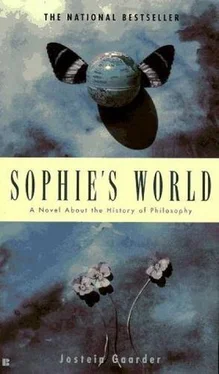Jostein Gaarder - Sophie's World - A Novel About the History of Philosophy
Здесь есть возможность читать онлайн «Jostein Gaarder - Sophie's World - A Novel About the History of Philosophy» весь текст электронной книги совершенно бесплатно (целиком полную версию без сокращений). В некоторых случаях можно слушать аудио, скачать через торрент в формате fb2 и присутствует краткое содержание. ISBN: , Издательство: BERKLEY BOOKS, NEW YORK, Жанр: Философия, на английском языке. Описание произведения, (предисловие) а так же отзывы посетителей доступны на портале библиотеки ЛибКат.
- Название:Sophie's World: A Novel About the History of Philosophy
- Автор:
- Издательство:BERKLEY BOOKS, NEW YORK
- Жанр:
- Год:неизвестен
- ISBN:0-425-15225-1
- Рейтинг книги:4 / 5. Голосов: 1
-
Избранное:Добавить в избранное
- Отзывы:
-
Ваша оценка:
- 80
- 1
- 2
- 3
- 4
- 5
Sophie's World: A Novel About the History of Philosophy: краткое содержание, описание и аннотация
Предлагаем к чтению аннотацию, описание, краткое содержание или предисловие (зависит от того, что написал сам автор книги «Sophie's World: A Novel About the History of Philosophy»). Если вы не нашли необходимую информацию о книге — напишите в комментариях, мы постараемся отыскать её.
Sophie's World: A Novel About the History of Philosophy — читать онлайн бесплатно полную книгу (весь текст) целиком
Ниже представлен текст книги, разбитый по страницам. Система сохранения места последней прочитанной страницы, позволяет с удобством читать онлайн бесплатно книгу «Sophie's World: A Novel About the History of Philosophy», без необходимости каждый раз заново искать на чём Вы остановились. Поставьте закладку, и сможете в любой момент перейти на страницу, на которой закончили чтение.
Интервал:
Закладка:
When a body—a tree or an animal, for instance—died and disintegrated, the atoms dispersed and could be used again in new bodies. Atoms moved around in space, but because they had “hooks” and “barbs,” they could join together to form all the things we see around us.
So now you see what I meant about Lego blocks. They have more or less the same properties as those which Democritus ascribed to atoms. And that is what makes them so much fun to build with. They are first and foremost indivisible. Then they have different shapes and sizes. They are solid and impermeable. They also have “hooks” and “barbs” so that they can be connected to form every conceivable figure. These connections can later be broken again so that new figures can be constructed from the same blocks.
The fact that they can be used over and over is what has made Lego so popular. Each single Lego block can be part of a truck one day and part of a castle the day after. We could also say that lego blocks are “eternal.” Children of today can play with the same blocks their parents played with when they were little.
We can form things out of clay too, but clay cannot be used over and over, because it can be broken up into smaller and smaller pieces. These tiny pieces can never be joined together again to make something else.
Today we can establish that Democritus’ atom theory was more or less correct. Nature really is built up of different “atoms” that join and separate again. A hydrogen atom in a cell at the end of my nose was once part of an elephant’s trunk. A carbon atom in my cardiac muscle was once in the tail of a dinosaur.
In our own time, however, scientists have discovered that atoms can be broken into smaller “elemental particles.” We call these elemental particles protons, neutrons, and electrons. These will possibly some day be broken into even lesser particles. But physicists agree that somewhere along the line there has to be a limit. There has to be a “minimal part” of which nature consists.
Democritus did not have access to modern electronic apparatus. His only proper equipment was his mind. But reason left him no real choice. Once it is accepted that nothing can change, that nothing can come out of nothing, and that nothing is ever lost, then nature must consist of infinitesimal blocks that can join and separate again.
Democritus did not believe in any “force” or “soul” that could intervene in natural processes. The only things that existed, he believed, were atoms and the void. Since he believed in nothing but material things, we call him a materialist.
According to Democritus, there is no conscious “design” in the movement of atoms. In nature, everything happens quite mechanically. This does not mean that everything happens randomly, for everything obeys the inevitable laws of necessity. Everything that happens has a natural cause, a cause that is inherent in the thing itself. Democritus once said that he would rather discover a new cause of nature than be the King of Persia.
The atom theory also explains our sense perception, thought Democritus. When we sense something, it is due to the movement of atoms in space. When I see the moon, it is because “moon atoms” penetrate my eye.
But what about the “soul,” then? Surely that could not consist of atoms, of material things? Indeed it could. Democritus believed that the soul was made up of special round, smooth “soul atoms.” When a human being died, the soul atoms flew in all directions, and could then become part of a new soul formation.
This meant that human beings had no immortal soul, another belief that many people share today. They believe, like Democritus, that “soul” is connected with brain, and that we cannot have any form of consciousness once the brain disintegrates.
Democritus’s atom theory marked the end of Greek natural philosophy for the time being. He agreed with ,Her-aclitus that everything in nature “flowed,” since Torms come and go. But behind everything that flowed there were some eternal and immutable things that did not flow. Democritus called them atoms.
During her reading Sophie glanced out of the window several times to see whether her mysterious correspondent had turned up at the mailbox. Now she just sat staring down the road, thinking about what she had read. She felt that Democritus’s ideas had been so simple and yet so ingenious. He had discovered the real solution to the problem of “basic substance” and “transformation.” This problem had been so complicated that philosophers had gone around puzzling over it for generations. And in the end Democritus had solved it on his own by using his common sense.
Sophie could hardly help smiling. It had to be true that nature was built up of small parts that never changed. At the same time Heraclitus was obviously right in thinking that all forms in nature “flow.” Because everybody dies, animals die, even a mountain range slowly disintegrates. The point was that the mountain range is made up of tiny indivisible parts that never break up.
At the same time Democritus had raised some new questions. For example, he had said that everything happened mechanically. He did not accept that there was any spiritual force in life—unlike Empedocles and An-axagoras. Democritus also believed that man had no immortal soul.
Could she be sure of that?
She didn’t know. But then she had only just begun the philosophy course.
Fate
… the “fortune-teller” is trying to foresee something that is really quite unforeseeable ...
Sophie had been keeping her eye on the mailbox while she read about Democritus. But just in case, she decided nevertheless to take a stroll down to the garden gate.
When she opened the front door she saw a small envelope on the front step. And sure enough—it was addressed to Sophie Amundsen.
So he had tricked her! Today of all days, when she had kept such careful watch on the mailbox, the mystery man had sneaked up to the house from a different angle and just laid the letter on the step before making off into the woods again. Drat!
How did he know that Sophie was watching the mailbox today? Had he seen her at the window? Anyway, she was glad to find the letter before her mother arrived.
Sophie went back to her room and opened the letter. The white envelope was a bit wet around the edges, and had two little holes in it. Why was that? It had not rained for several days.
The little note inside read:
Do you believe in Fate?
Is sickness the punishment of the gods?
What forces govern the course of history?
Did she believe in Fate? She was not at all sure. But she knew a lot of people who did. There was a girl in her class who read horoscopes in magazines. But if they believed in astrology, they probably believed in Fate as well, because astrologers claimed that the position of the stars influenced people’s lives on Earth.
If you believed that a black cat crossing your path meant bad luck—well, then you believed in Fate, didn’t you? As she thought about it, several more examples of fatalism occurred to her. Why do so many people knock on wood, for example? And why was Friday the thirteenth an unlucky day? Sophie had heard that lots of hotels had no room number 13. It had to be because so many people were superstitious.
“Superstitious.” What a strange word. If you believed in Christianity or Islam, it was called “faith.” But if you believed in astrology or Friday the thirteenth it was superstition! Who had the right to call other people’s belief superstition?
Sophie was sure of one thing, though. Democritus had not believed in fate. He was a materialist. He had only believed in atoms and empty space.
Sophie tried to think about the other questions on the note.
Читать дальшеИнтервал:
Закладка:
Похожие книги на «Sophie's World: A Novel About the History of Philosophy»
Представляем Вашему вниманию похожие книги на «Sophie's World: A Novel About the History of Philosophy» списком для выбора. Мы отобрали схожую по названию и смыслу литературу в надежде предоставить читателям больше вариантов отыскать новые, интересные, ещё непрочитанные произведения.
Обсуждение, отзывы о книге «Sophie's World: A Novel About the History of Philosophy» и просто собственные мнения читателей. Оставьте ваши комментарии, напишите, что Вы думаете о произведении, его смысле или главных героях. Укажите что конкретно понравилось, а что нет, и почему Вы так считаете.












